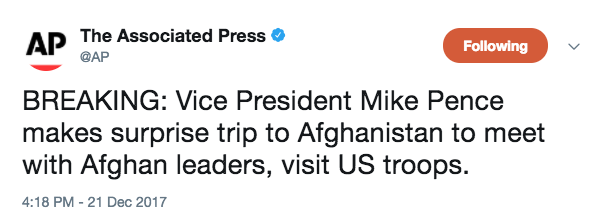Vice President Mike Pence arrived in Afghanistan, at Bagram Air Base, on Thursday for a surprise trip to meet with leaders and visit U.S. troops.

Mike Pence (Twitter)
“I believe victory is closer than ever before,” Pence told troops at Bagram late Thursday night, local time, CNN reported.
Pence also met with Afghan President Ashraf Ghani in Kabul.
“We’re here to see this through,” Pence told Ghani, CNN reported. “We believe that we are now on a path to achieving a lasting victory for freedom and security in Afghanistan.”
Pence later went back to Bagram and rallied several hundred U.S. troops.
“The United States of America will no longer be bound by arbitrary timetables in Afghanistan. As the President said, America’s enemies must never know our plans. They must never believe they can wait us out. Instead our decisions will be based on an objective assessment of conditions on the ground,” Pence said, CNN reported. “A relentless pursuit of victory will guide us and nothing else.”
This is the first visit to Afghanistan by either the sitting President or Vice President.
The visit comes unannounced, after Pence this week cancelled a trip to the Middle East following President Donald Trump’s announcement that the U.S. would recognize Jerusalem as the capital of Israel.
Trump in August made his first prime time speech as President and said the U.S. was “destroying terrorists” and “will win this war.”
The 16-year war against the Taliban and other terrorist groups in Afghanistan had been on the minds of many, as it had been recently announced that Trump had come to a conclusion about what the strategy will be moving forward against terrorism in the Middle East.
“Our troops will fight to win. We will fight to win,” Trump stressed in his address. “From now on, victory will have a clear definition: attacking our enemies, obliterating ISIS, crushing al Qaeda, preventing the Taliban from taking over Afghanistan, and stopping mass terror attacks against America before they emerge.”
The message was clear: the U.S. is going to finish the job in Afghanistan, but the President wouldn’t say how or when, aside from saying the U.S. Military will be given the tools it needs to get the job done, and that the military will be able to operate on the ground as it sees fit.
It had been previously reported that the President would announce a deployment of 4,000 troops to Afghanistan during his address. But he did not talk numbers on Monday night in front of the American people. In fact, numbers and specific details were specifically omitted and absent from his address. Earlier this year there were also reports that the U.S. could send an additional 4,000 troops to Afghanistan. At the time, President Trump was reportedly considering doing the exact opposite and removing all troops from the country, thus relying on drones and U.S. Special Forces to get the job done.
Trump in June gave Defense Secretary Jim Mattis and the Department of Defense the power to decide whether or not, and how many, additional American troops would be sent to Afghanistan. Following the President’s address, Mattis said he was preparing to execute Trump’s orders.
“I have directed the Chairman of the Joint Chiefs of Staff to make preparations to carry out the president’s strategy. I will be in consultation with the Secretary General of NATO and our allies – several of which have also committed to increasing their troop numbers. Together, we will assist the Afghan Security forces to destroy the terrorist hub,” Mattis said in a statement.
There are currently about 8,400 U.S. troops in Afghanistan. About six years ago, there were roughly 100,000 service members in Afghanistan. Trump would be the third President in 16 years to surge troops into Afghanistan; a timeline of the U.S. in Afghanistan can be seen here.



